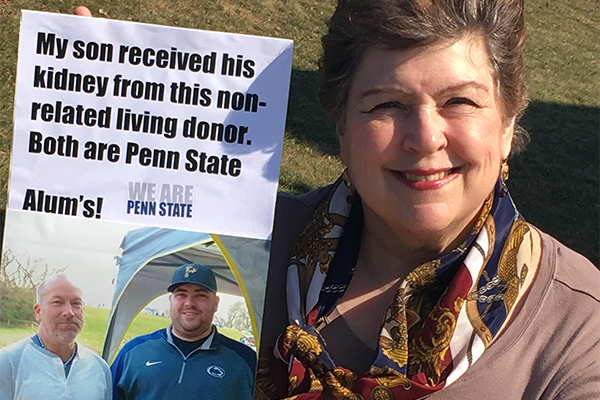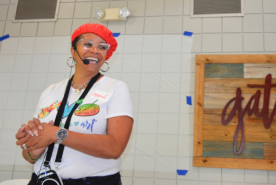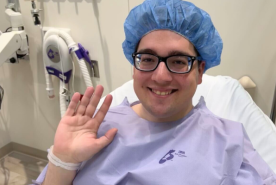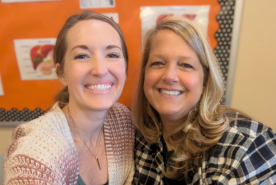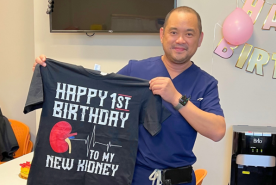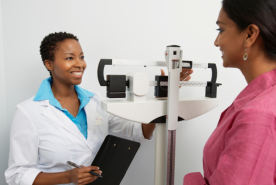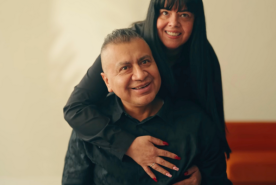October 25, 2018
When Bobbie Reed’s son, Alex, graduated college in 2013, she felt like he had the world at his fingertips. He had just finished five years as a college athlete at Penn State and was on a path to a successful career at his family’s insurance agency. For all five years, Alex received medical clearance to play baseball with no questions asked—so when he suddenly got sick two weeks after his graduation, it came as a shock.
At first, the doctors said that Alex’s kidney function was a bit impaired but would likely bounce back. Unfortunately, by October, Alex ended up in end stage renal failure with his physician urging him to get on dialysis and immediately start the process of getting on the list for a kidney transplant.
As Alex’s condition continued to worsen during the process of finding a donor, Bobbie stepped in as his caregiver and advocate—and when Alex was added to the transplant list, Bobbie immediately put her sales background to use. “A lot of people think you have to go out there and put up billboards and wear t-shirts, but I didn’t do that,” she says. “I utilized my sales experience to help me come up with a plan to find a kidney for my child.”
Bobbie’s approach looked something like this:
Make a list.
The first thing Bobbie did was make a list. She thought of every single person, affiliation, or membership she had—local politicians, schools, businesses, friends, relatives and more.
Do the research.
For any entry on the list where Bobbie didn’t know someone personally, she called the location and asked for the proper contact to reach out to regarding the search for a potential kidney donor. Doing this ensured that the “ask” was going to go to the right person and not be taken as junk mail.
Think outside the box.
Bobbie met with the advertising design instructor at a local vocational school and asked to add something new to the curriculum—a program that allowed the students to create informational cards for distribution to potential donors, explaining how they could help Alex. There was no cost to do this. These creative projects helped not only Bobbie and Alex, but the students as well – they were able to use them to expand their portfolios.
Make another list.
When Bobbie felt like she had exhausted all the options, she didn’t stop. Instead, she took another look at her network and reached out to additional potential donors through her dentist’s office, local bank branch, and even the shop where she got her oil changed. She also worked with her local church, which posted information about the request in their bulletin, as well as the Penn State Alumni Association, which published a feature story about Alex.
Always say “thank you.”
Every time someone published an article or wrote something on social media, Bobbie sent a personalized letter thanking them for the help. She also shared those articles on her own social media as both a “thank you” and a way to get the word across to even more people. She asked those viewing the post on social media to share it on their pages, which exponentially increased the number of people who learned about Alex’s need to find a kidney.
Bobbie’s hard work came to fruition on September 12, 2015, when Alex was invited to a tailgate at Penn State. John Hyde, one of his friends’ fathers, was manning the grill and asked Alex if he needed anything. When Alex asked for a breakfast sandwich, Hyde replied, “Is there anything else you need? How about my kidney?”
It was then that Hyde told Alex that he had seen Bobbie’s social media posts and had started the process to become a donor eight months prior. As soon as he was approved, he told his son to invite Alex to the tailgate party so he could tell him the exciting news. The transplant surgery took place on November 9, 2015 and was a great success.
Even if you don’t work in sales or have any sales experience, there are aspects of Bobbie’s process that can help you navigate the search for a donor for yourself or a loved one. Here are a few final tips from Bobbie to add to those listed above:
Don’t be afraid.
“What’s the worst they can say,” says Bobbie. “No?”
Use the resources of the National Kidney Foundation.
A great place to start is the website for THE BIG ASK: THE BIG GIVE website, which Bobbie actually helped develop. The site features a variety of resources to help both patients and donors learn more about the kidney donation process. Another great place to learn more and get answers to any specific questions you may have is the toll-free NKF Cares Hotline.
Don’t give up.
Bobbie and Alex’s story is proof that things will happen when and where you least expect it.
